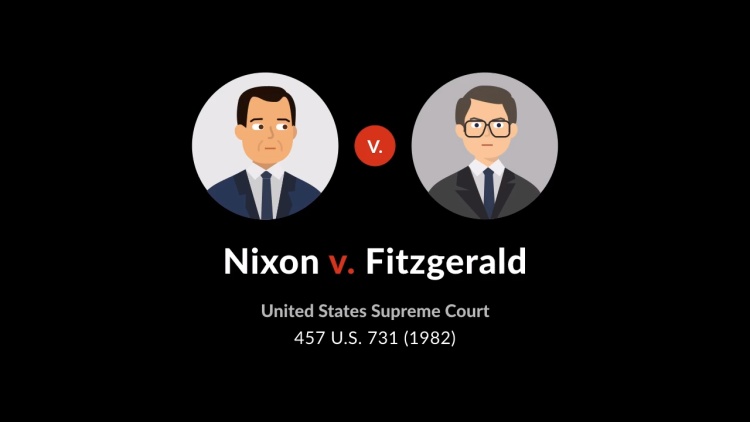Richard Nixon v. A. Ernest Fitzgerald
United States Supreme Court
457 U.S. 731 (1982)
- Written by Megan Petersen, JD
Facts
A. Ernest Fitzgerald (plaintiff) was a management analyst with the Department of the Air Force. In January 1970, he lost his job when it was eliminated through a departmental reorganization and reduction in force. Previously, in November 1968, Fitzgerald testified before Congress about inflated costs and technical difficulties surrounding the Air Force’s new aircraft. His testimony reflected negatively on the Air Force and was met with a negative reaction by Fitzgerald’s supervisors, which he alleged was the reason behind his dismissal. Following his dismissal, President Nixon (defendant) publicly claimed personal responsibility for deciding to fire Fitzgerald, but the White House later retracted this statement. Fitzgerald brought suit in district court against President Nixon on the grounds that he was improperly dismissed because of his negative comments about the Air Force. Fitzgerald sought civil damages, and President Nixon argued that he was absolutely immune from suit for actions taken in his official capacity. The district and circuit courts rejected the president’s claim of immunity, and the United States Supreme Court granted certiorari.
Rule of Law
Issue
Holding and Reasoning (Powell, J.)
Concurrence (Burger, C.J.)
Dissent (White, J.)
What to do next…
Here's why 907,000 law students have relied on our case briefs:
- Written by law professors and practitioners, not other law students. 47,100 briefs, keyed to 996 casebooks. Top-notch customer support.
- The right amount of information, includes the facts, issues, rule of law, holding and reasoning, and any concurrences and dissents.
- Access in your classes, works on your mobile and tablet. Massive library of related video lessons and high quality multiple-choice questions.
- Easy to use, uniform format for every case brief. Written in plain English, not in legalese. Our briefs summarize and simplify; they don’t just repeat the court’s language.





